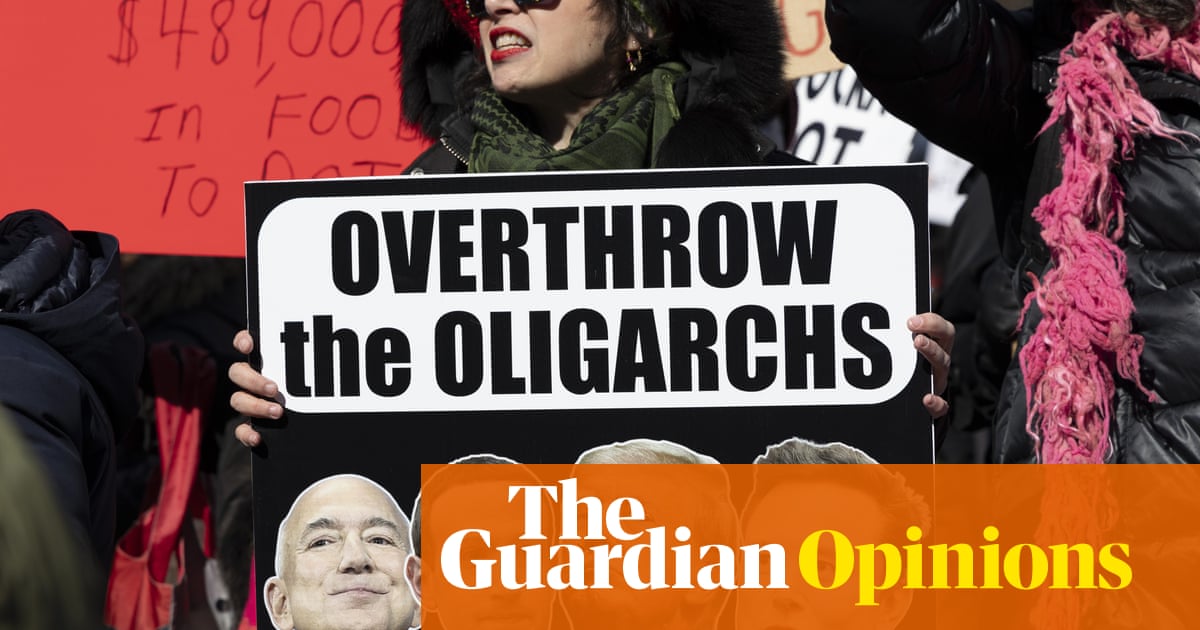Late at night, a young father stands in a dumpster in Buenos Aires, passing scraps and discarded food to his wife and two young children. In a subway station, a homeless couple sleep in an unoccupied corner, their heads sheltered by cardboard boxes. On the streets of the city’s slums – known as villas miseria – children queue for plastic containers of food, their parents hiding out of sight.
Such scenes have become increasingly common as Argentina faces some of its harshest austerity measures yet. Under the rightwing president Javier Milei, who came to power a year ago, public spending has been slashed, wages depressed, tens of thousands of government employees laid off and subsidies for energy and transport ended.
Milei’s allies celebrate the impact of their leader’s “chainsaw” campaign of fiscal balance and deregulation.
“I’m very happy with the job we’ve been doing,” beamed Federico Sturzenegger, Argentina’s minister of deregulation and state transformation, praising the government’s “difficult, bold decisions”.
“We believe things have worked much better than anybody could have imagined. I think people feel the same thing … there’s an increased optimism.”

But Milei’s severe spending cuts have hit the poor hard. Statistics show that for the first half of this year, almost 53% of Argentina’s 45 million people were living in poverty – a two-decade high – up from 41.7% in the second half of 2023. Some 18% of people were living in extreme poverty, while more than six out of 10 of under-14s lived below the poverty line.
“The social reality is deteriorating by the day,” warned Myriam Bregman, a prominent socialist leader and former presidential candidate, predicting that the growing social drama would make the remaining three years of Milei’s term “convulsive”.
In Barrio Mugica, a poor community where support for Milei was strong last year, many lament the cost-cutting.
“A lot, lot, lot has changed this last year, for the worse. Milei has cut everything,” said Laila Gómez, 64. “The subsidies for gas have been cut, and food prices have increased rapidly. I’ve had to stop eating meat completely, and cut down on the number of meals. Every time I go to the shops I buy less and less.”
Gómez, who lives in a one-room home, says her monthly rent rocketed from 15,000 pesos in December 2023 to 100,000 now. “Everything’s so bad, I don’t know what’s going to happen to us next.”
Nearby, 37-year-old Jessica Tocomas collects her daughter from school, two twin babies strapped to her chest. Due to the halting of all public works, she said her husband had struggled to find construction jobs for the first time in 20 years. “It’s been a really hard year. Everything’s up – the food, the buses, the bills – but the salaries are the same.”

Milei rose from relative political obscurity last year on promises to take a chainsaw to the state and rescue Argentina from decades of “impoverishment [and] decadence”. His message hit home in a country which feared hyperinflation, and where poverty rates had not fallen below 25% for almost 40 years.
In his maiden speech, the self-described anarcho-capitalist compared his victory to the fall of the Berlin Wall but said the economic challenge was “titanic” and warned things would get worse before improving.
The libertarian has indeed succeeded in slashing the monthly inflation rate from 26% last December to 2.7% in October. The peso has strengthened against the black market dollar over the past six months.
“The economy is recovering very clearly. The mood is much more upbeat [than] at the end of last year [when] there was a lot of uncertainty, even among those that were supporting Milei,” said Sturzenegger.
But many people living in the most desperate situations say the changes are only benefiting the rich.
In La Carolina, an informal settlement an hour from central Buenos Aires, mother-of-two Marcela Pereyra said she had lost her job selling cheese buns in October, due to falling demand. Her children now relied on school for food. Statistics show that purchasing power has fallen this year to record levels not seen since the 2001 economic crisis.

Pereyra herself, who lives in a windowless pine-plank house with a corrugated iron roof, has cut down to eating only one meal a day. “The previous president helped people who did not have a lot, but this president gives us nothing,” she complained. “People have hope that the economy and the country will change, but it’s not changing here.”
The area, where roads are made of mud, is home to some of the country’s poorest. Many residents do not have bathrooms or potable drinking water. Agustina Aguirre, who works in the area for toilet-building NGO Módulo Sanitario, said the cuts had affected the entire community. “A lot of people have lost their jobs, the community centres have closed, the government stopped sending food rations,” she said.
Norma Canepa, a 48-year-old cook and activist who runs a soup kitchen in the neighbourhood, said Milei “only works for the rich”. Her kitchen has resorted to cooking with firewood instead of gas amid spiralling prices. She now needs to cook over 40kg of rice each day compared to 27kg this time last year due to increasing demand.
“Often the children come to get the food, and the parents hide, from shame and embarrassment,” Canepa added. Soup kitchens were some of the first operations to be hit by cutbacks, with Milei withdrawing and freezing budgets, saying he wanted to end “the business of poverty”. Many centres have now closed or reduced the number of meals offered.
The elderly have also been severely affected, with Milei vetoing a law to increase pensions by 8% and scaling back free medications for retirees.

According to a report by the Center of Argentine Economic Politics (Cepa), in the first 10 months of the year, retirement pensions were the most affected expense by Milei’s chainsaw, accounting for 24.2% of that period’s government cuts. Public works follow with 23.6%.
“It has been total chaos, a disaster. Other governments used to help the children and the elderly, but not this government. It does not care,” said Yolanda Vera, a 63-year-old pensioner from Barrio Mugica.
Dozens of retirees and pensioners protest against the austerity measures each Wednesday outside Congress. “I see no protest, because there are several million pensioners,” Sturzenegger said, playing down the scale of those demonstrations.
Despite his tough austerity measures, polls show Milei retains support of half Argentina’s population. A survey conducted for Bloomberg News showed nearly 47% support in November.
Widespread protests have also failed to take a grip of the country, as predicted, while the left-leaning opposition is in disarray.
Bregman accused Argentina’s traditional opposition parties of failing to stand up to Milei’s chainsaw policies, beyond “spicy” tweets or speeches to congress: “The problem is not just Javier Milei – it’s that the opposition isn’t doing anything about it.”

Bregman claimed the scruffy-maned Milei – who styles himself as a muscular lion – did indeed treat pensioners and the poor like a dangerous predator. But when it came to the wealthy, “Javier Milei is the little pussy cat of the economic powers – and the opposition is doing nothing, or very little, to challenge this pussy cat.”
Julio Montero, an Argentine political scientist at the University of San Andrés, said many people blamed previous administrations for the high poverty rates, that Milei was careful in preparing people for a crisis, and that his “populist strategy has been very successful”.
“He managed to persuade the people that traditional politicians are a corrupt class that seeks to preserve their privileges at the expense of the people, and that traditional parties are responsible for all their problems… so in spite of the economic crisis, many people see Milei as a messiah that is here to protect and represent them,” Montero said, adding that two decades of economic crises had desensitised people to poverty.
Milei, who Donald Trump recently praised for doing an “incredible” job, has blamed increasing poverty on the economy he inherited, while also claiming the crisis is over and poverty is “going down”.
“The period of pain is over,” he told business leaders last month.
Eduardo Donza, a researcher at the Argentine Catholic University’s Social Debt Observatory, which monitors poverty rates, said that while recent estimates show poverty had fallen from its height earlier this year, in the last quarter it remained high at 49.9% and that the decline is slow. “I estimate that it will take a long time for the worst affected to recover,” he said.
At the entrance to La Carolina, activists have painted a message to Milei on to a wall. “Get your chainsaw off our rights,” it says.
Sturzenegger said Milei’s economic crusade was only just getting started.
“Now we’re entering into the period of what I call the deep chainsaw. We did the chainsaw – now we’re going into deep chainsaw.”

 2 months ago
34
2 months ago
34













































